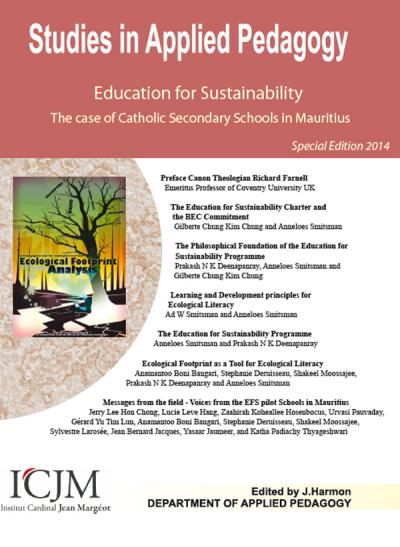The concept of environmental education (EE) has emerged with dominant reductionist programmes and education oriented primarily to the conservation of resources. The Conference in Rio de Janeiro marked a turning point and emphasized the significance of sustainable development in Agenda 21 (UNESCO, 1992). This document calls for a reorientation of EE and introduces the principles of sustainability and the need to apply them to economic, social, cultural and environmental dimensions of human development.
This Special Edition 2014 of Studies in Applied Pedagogy on ‘Education for Sustainability (EFS): The Case of Catholic Secondary Schools in Mauritius’ provides an enriching and thought provoking insight into education through the lens of sustainability with contextualised thinking. Our thanks go to the different contributors namely academics, researchers and practitioners, policy makers, head of schools, teachers and pupils. While we are now in our third year of publication, these contributions give new impetus to Studies in Applied Pedagogy whose mission is to provide a forum for critical reflection and action on societal issues related to education. This edition is prefaced by Richard Farell (Emeritus Professor of Neighbourhood Regeneration, Coventry University, UK Canon Theologian, Coventry Cathedral, and UK) who provides a theological perspective on education for sustainability. In fact, EFS goes beyond the seemingly neutral discourse of ‘waste management’, ‘rain harvesting’ or what could be called the ‘green rhetoric’.For Farell, EFS should rather create critical awareness amongst our youth that ‘dominant global narratives promoting the freedom of the market and the rights of corporate institutions […] have to be questioned if heightened inequality, social conflict and environmental destruction are to be reversed and sustainable human flourishing is to be achieved’. This edition is a collection of six papers which present education for sustainability in action.
In ‘The Education for Sustainability Charter and BEC commitment’, Chung Kim Chung & Smitsman showcase how Catholic secondary schools have made the commitment to Ecological Literacy Development since 2011. To ensure that Education for Sustainability (EFS) receives the support of the school management and school community, an EFS charter and pledge was created in 2013. The paper provides an overview of the characteristics of the BEC educational system to better understand the context and system impacts of EFS implementation, the BEC management support for EFS, the principles and co-learning process on which the EFS Charter and Pledge rests, and its proposed actions.
In the second paper, Deenapanray, Smitsman, & Chung Kim Chung discuss ‘The Philosophical Foundations of the Education for Sustainability Programme’. The authors address critical issues related to the purpose of education in an unsustainable world, raising at the same time the paradoxes of modern education, and show how they are part of the problem. The principles underlying EFS programme, developed by ELIA-Ecological Living In Action (ELIA) in collaboration with the Bureau of Catholic Education (BEC) are discussed. The EFS programme is summarized using a Theory of Change perspective, and provides a normative approach for enabling learning for sustainability.
The third paper is about ‘Learning and Development in Ecological Literacy’. This paper offers five key principles for learning and development based on current scientific understanding of complex adaptive systems. Smitsman & Smitsman foreground thatthe kind of learning that is promoted through conventional education often lacks the deeper transformative learning that is part of sustainability education. The authors examine the reasons for this and propose integrated solutions for how to change this with reference to Catholic secondary schools in Mauritius.
Fourth, ‘The Education for Sustainability Programme’(Smitsman & Deenapanray) provides an overview of the EFS programme and lessons learned since 2011, with an outline of how the EFS programme will unfold over the coming years in the Catholic schools in Mauritius. In 2011, the Catholic secondary schools that are part of the Catholic education network embarked on an extra-curricular programme for Ecological Literacy Development (ELP) developed by ELIA in collaboration with BEC. In 2013, this evolved into EFS that is being integrated into the curriculum work plan and school activities for three selected pilot schools in Mauritius – Loreto College Curepipe, St Mary’s College Rose-Hill and BPS Fatima Goodlands.
Fifth, ‘Ecological Footprint as a Tool for Ecological Literacy’ is a dual perspective on ecological literacy by teachers and scientific project coordinators involved in the EFS programme. Bangari, Deruisseau, Moossajee (who are teachers at Saint Marys’ College), Deenapanray & Smitsman (scientific coordinators in the project) discuss the application of Ecological Footprint Analysis (EFA) at St Mary’s College Rose-Hill. While Ecological Footprint (EF) is a powerful pedagogical tool for engaging the school community in place-based education, the authors make the case for EF as a normative tool to highlight and address the ethical dimensions of the consumption of scarce resources.
Finally, ‘Messages from the Field – Voices from the EFS pilot schools in Mauritius’ take us on a journey into three Catholic secondary schools which act as pilot schools for the implementation of the EFS programme. Students, teachers and management share their stories and experiences of working with the EFS programme over the last three years, and their aspirations for the future. These stories also demonstrate the learning process and transitions that each of the participating organizations has moved through. In fact, I would say that narrative events tend to be one of the best loci for making tacit assumptions and norms more explicit. So, a close reading of these ‘voices’ demonstrates how EFS brings about individual agency and can sustain social transformation through education.
‘EDUCATION FOR SUSTAINABILITY, THE CASE OF CATHOLIC SECONDARY SCHOOLS IN MAURITIUS’ : A new impetus to Studies in Applied Pedagogy
- Publicité -
EN CONTINU ↻


